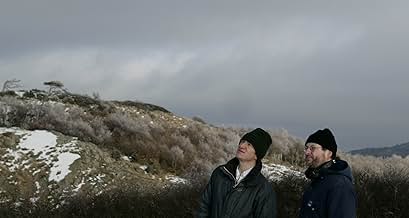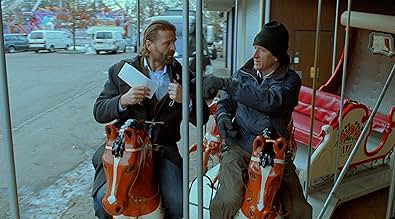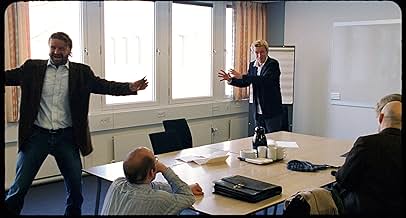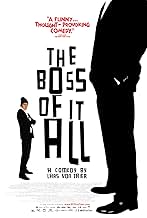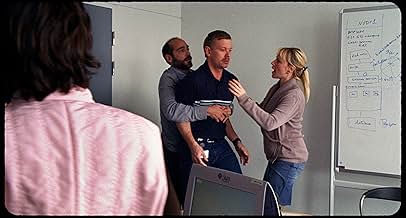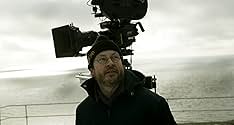IMDb-BEWERTUNG
6,6/10
13.129
IHRE BEWERTUNG
Ein IT-Unternehmen stellt einen Schauspieler als Firmenpräsident ein, um einem verschrobenen Isländer beim Verkauf des Unternehmens zu helfen.Ein IT-Unternehmen stellt einen Schauspieler als Firmenpräsident ein, um einem verschrobenen Isländer beim Verkauf des Unternehmens zu helfen.Ein IT-Unternehmen stellt einen Schauspieler als Firmenpräsident ein, um einem verschrobenen Isländer beim Verkauf des Unternehmens zu helfen.
- Regie
- Drehbuch
- Hauptbesetzung
- Auszeichnungen
- 1 Gewinn & 7 Nominierungen insgesamt
Friðrik Þór Friðriksson
- Finnur
- (as Fridrik Thor Fridriksson)
Lars von Trier
- Narrator
- (Nicht genannt)
Empfohlene Bewertungen
I think if Von Trier's name wasn't attached to the project the people commenting might me more willing to accept this brilliant comedy. If you watch this expecting Manderlay, Dancer in the Dark, or even The Idiots, you will be disappointed. One gets the feeling from the narration (done by Von Trier himself, or at least someone speaking directly for him) this was a one off for Von Trier;a film meant to cleanse his pallet before he sinks his teeth back into American Democracy. But by taking himself less seriously he's made one of the best films of his career. I saw this at the Pusan International Film Festival and it was one of the 2 best films I saw the entire week. A couple times I was close to tears.
Lars von Trier has done a modern comedy that gives (me) associations to the plays of the Norwegian-Danish comedy writer Ludvig Holberg (1684-1754). Even if it is a comedy and Lars von Trier himself in the start of the movie tells we can lean back and enjoy being entertained, the film has a message that - if you are open to it - will give you something to think about regarding moral and ethics. Like all good movies this has a surprisingly ending. "The Boss of it all" has divided the audience in Denmark in 2 groups a group who absolutely dislikes the movie and a group which is rather enchanted with it. As you can understand I belong to the last group.
Last Sunday's cinema outing with my friends here in Rome yielded a very pleasant surprise - Von Trier's unique latest flick, surprisingly enough, a comedy. I've read some comments claiming that this was one of his weakest movies - I respectfully, but firmly disagree. In fact, I would argue that even as a comedy, and thus deprived of the devices that normally make drama seem more powerful, this packed a punch on a par with Dancer in the Dark or Dogville, if not more. If understated power, rather than human agony and melodrama layered on very thick is what you best respond to, you might like Direktøren for det hele more than any other Von Trier movie you've seen so far.
Right from the opening shot, we are made to look into the windows of a cold and desolate office building in some characterless and efficient modern suburb like hundreds of others. Meanwhile, a narrator reassures us that this movie is a comedy. As such, he says, we are allowed not to think - to let this just be brainless entertainment. Hearing a narrator in a Von Trier movie make such an introduction, you just know that what you're about to watch will be anything but mindless fun! In fact, on hearing this I shifted rather uncomfortably in my seat, wondering what the Master Misanthrope had in store for me this time.
The basic plot: When Ravn, an IT company owner decides to sell his business off to a moody and irritable Icelandic businessman, he hires an actor to pretend that he's the Boss of Bosses. The pally, "cuddly", bearded Ravn, vaguely reminiscent of Robin Williams, explains his decision by saying that when he'd founded the company, he had never felt strong and charismatic enough to take on the mantle of president. He always preferred to just blend in with the rest of the staff, while actually pulling all the puppet strings. He had always told his staff that the "real" big boss (obviously non-existent) resided in America and never came to Denmark. When Ravn eventually decides to sell the company, the fussy Icelandic businessman expects the "real" president to sign the contact. For this reason, Ravn is forced to hire Kristoffer, an out-of-work, egocentrical actor, among other things obsessed with the obscure playwright Gambini and convinced that Ibsen is a talentless hack.
Naturally, Kristoffer knows nothing about the company, about IT and Ravn simply asks him to "improvise". Cue some cringeworthy company meetings with Kristoffer talking absolute crap (with one irascible employee, the "country bumpkin", constantly lashing out at him with his fist!). Cue also some inevitable office politics, involving the company's employees reacting to their new-found, flesh-and-blood figure-head, on whom they hang all their hopes and frustrations.
If this sounds like a Danish version of the British TV series "The Office" (remade also in America), please think again - the movie goes well beyond milking the comic potential of a typical contemporary office environment. The wonder of this movie lies in the way in which it plays with ethical issues. I won't give anything more of the plot away, as this would entail spoiling its central twists and surprises. Among other things, this multi-layered, dark and cynical comedy, which had my friends and I chatting for a solid two hours after we left the cinema, is about responsibility and what it means to be truly ethical. Holding oneself accountable for one's actions - how do you deal with that when the insatiable need to feel loved and approved of takes over? The movie is also a wonderful illustration of the typical contemporary corporate environment, whereby the employee is subtly demeaned in being prevented from ever putting a face to those provoking their misery on the workplace. It poses questions on what leadership really means. It shows us how a human being will become blind to the needs of others when it comes to satisfying one's vanity and emotional fragility.
Naturally, as a Lars Von Trier movie this is not a movie that has much faith in humanity. However, unlike Dancer in the Dark, it does not gang up on the viewer with its misanthropy and dramatic bullying. Unlike Dogville, it doesn't present a world in which moral nihilism is the only reality. Unlike Breaking the Waves, it doesn't revel in victimising its lead character. It's far more subtle and multi-facetted in its arguments against human integrity, not to mention that it's laugh-out-loud funny (the whole cinema was in stitches), superbly acted and truly unpredictable. I also enjoyed the cinematography, strictly hand-held digital camera with a purposefully "rudimentary" editing. Highly recommended, on several different levels.
Right from the opening shot, we are made to look into the windows of a cold and desolate office building in some characterless and efficient modern suburb like hundreds of others. Meanwhile, a narrator reassures us that this movie is a comedy. As such, he says, we are allowed not to think - to let this just be brainless entertainment. Hearing a narrator in a Von Trier movie make such an introduction, you just know that what you're about to watch will be anything but mindless fun! In fact, on hearing this I shifted rather uncomfortably in my seat, wondering what the Master Misanthrope had in store for me this time.
The basic plot: When Ravn, an IT company owner decides to sell his business off to a moody and irritable Icelandic businessman, he hires an actor to pretend that he's the Boss of Bosses. The pally, "cuddly", bearded Ravn, vaguely reminiscent of Robin Williams, explains his decision by saying that when he'd founded the company, he had never felt strong and charismatic enough to take on the mantle of president. He always preferred to just blend in with the rest of the staff, while actually pulling all the puppet strings. He had always told his staff that the "real" big boss (obviously non-existent) resided in America and never came to Denmark. When Ravn eventually decides to sell the company, the fussy Icelandic businessman expects the "real" president to sign the contact. For this reason, Ravn is forced to hire Kristoffer, an out-of-work, egocentrical actor, among other things obsessed with the obscure playwright Gambini and convinced that Ibsen is a talentless hack.
Naturally, Kristoffer knows nothing about the company, about IT and Ravn simply asks him to "improvise". Cue some cringeworthy company meetings with Kristoffer talking absolute crap (with one irascible employee, the "country bumpkin", constantly lashing out at him with his fist!). Cue also some inevitable office politics, involving the company's employees reacting to their new-found, flesh-and-blood figure-head, on whom they hang all their hopes and frustrations.
If this sounds like a Danish version of the British TV series "The Office" (remade also in America), please think again - the movie goes well beyond milking the comic potential of a typical contemporary office environment. The wonder of this movie lies in the way in which it plays with ethical issues. I won't give anything more of the plot away, as this would entail spoiling its central twists and surprises. Among other things, this multi-layered, dark and cynical comedy, which had my friends and I chatting for a solid two hours after we left the cinema, is about responsibility and what it means to be truly ethical. Holding oneself accountable for one's actions - how do you deal with that when the insatiable need to feel loved and approved of takes over? The movie is also a wonderful illustration of the typical contemporary corporate environment, whereby the employee is subtly demeaned in being prevented from ever putting a face to those provoking their misery on the workplace. It poses questions on what leadership really means. It shows us how a human being will become blind to the needs of others when it comes to satisfying one's vanity and emotional fragility.
Naturally, as a Lars Von Trier movie this is not a movie that has much faith in humanity. However, unlike Dancer in the Dark, it does not gang up on the viewer with its misanthropy and dramatic bullying. Unlike Dogville, it doesn't present a world in which moral nihilism is the only reality. Unlike Breaking the Waves, it doesn't revel in victimising its lead character. It's far more subtle and multi-facetted in its arguments against human integrity, not to mention that it's laugh-out-loud funny (the whole cinema was in stitches), superbly acted and truly unpredictable. I also enjoyed the cinematography, strictly hand-held digital camera with a purposefully "rudimentary" editing. Highly recommended, on several different levels.
This movie is undoubtedly an ideological departure from the recent LVT endeavours. It has no tear-jerking aspirations, except as a matter of laughs. In a way, it is self-ridiculing, adding an extra layer of hilarious logical traps. It is a bit slow in the third quarter, but then picks up. Special noteworthy inventions: the Icelandic buyer (a riot!), his translator, mythical Gambini and the "Hanged Cat"! Acting, acting, acting is very witty and plastic. It makes the piece (with mostly indoors setting) less cinematic, more of a filmed play (which is undoubtedly the intention of the director). Good entertainment and fairly original.
What a wonderful surprise this film was! I never expected a pretty straightforward satire from von Trier and Dogme, but I certainly got it. The plot sounds well-used and obvious but the way it was transferred to a Scandinavian IT culture, the distanced approach to character writing, improvisation, and superb acting and direction made it a great comedy. On reflection, what was really hilarious was the massively over-inflated self-importance of each and every character. Ali G. and Borat could learn a few things from these Danes (and one very irate Icelander).
As the end credits voice-over said, "Apologies to those who expected more, and to those who expected less. The others got what they deserved". I was glad to be one of the others.
As the end credits voice-over said, "Apologies to those who expected more, and to those who expected less. The others got what they deserved". I was glad to be one of the others.
Wusstest du schon
- WissenswertesThis movie is shot with camera technique called Automavision, an innovation in which the camera angles and movements are selected by a computer. The media notes explain technique, "a principle for shooting film developed with the intention of limiting human influence by inviting chance in from the cold". There are odd framings and jump cuts within scenes making everything seem a bit unsettled.
- VerbindungenFeatured in Smagsdommerne: Folge #4.16 (2006)
Top-Auswahl
Melde dich zum Bewerten an und greife auf die Watchlist für personalisierte Empfehlungen zu.
Details
Box Office
- Budget
- 3.000.000 € (geschätzt)
- Bruttoertrag in den USA und Kanada
- 51.548 $
- Eröffnungswochenende in den USA und in Kanada
- 7.855 $
- 27. Mai 2007
- Weltweiter Bruttoertrag
- 3.111.395 $
- Laufzeit1 Stunde 39 Minuten
- Farbe
- Sound-Mix
- Seitenverhältnis
- 1.85 : 1
Zu dieser Seite beitragen
Bearbeitung vorschlagen oder fehlenden Inhalt hinzufügen

Oberste Lücke
By what name was The Boss of It All (2006) officially released in Canada in English?
Antwort

